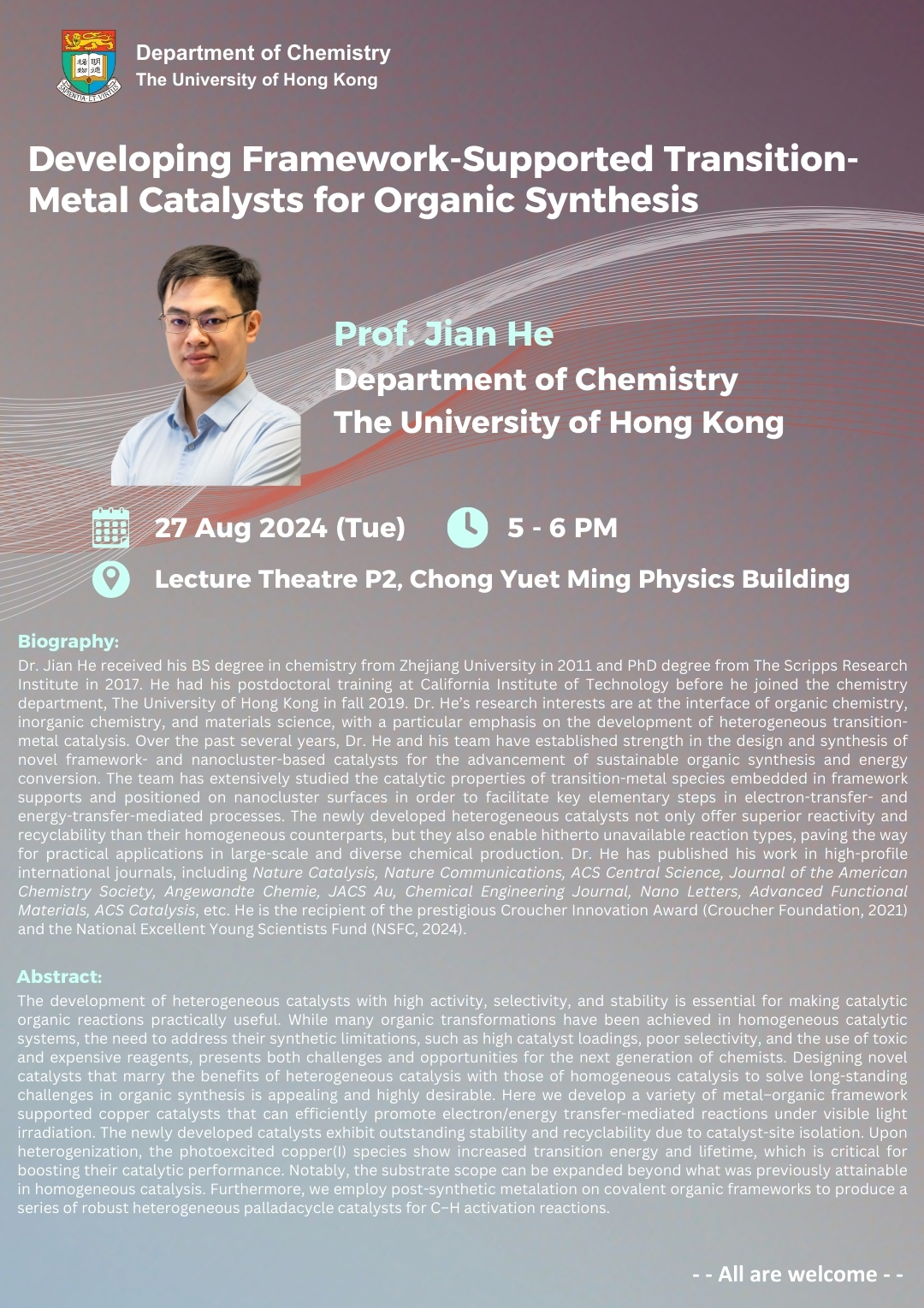| Date | 27 Aug 2024 |
| Time | 5:00 pm - 6:00 pm (HKT) |
| Venue | Lecture Theatre P2, Chong Yuet Ming Physics Building |
| Speaker | Prof. Jian HE |
| Institution | Department of Chemistry, The University of Hong Kong |

Title:
Developing Framework-Supported Transition-Metal Catalysts for Organic Synthesis
Schedule:
Date: 27th August, 2024 (Tuesday)
Time: 5 - 6 pm (HKT)
Venue: Lecture Theatre P2, Chong Yuet Ming Physics Building
Speaker:
Prof. Jian HE
Department of Chemistry
The University of Hong Kong
Biography:
Dr. Jian He received his BS degree in chemistry from Zhejiang University in 2011 and PhD degree from The Scripps Research Institute in 2017. He had his postdoctoral training at California Institute of Technology before he joined the chemistry department, The University of Hong Kong in fall 2019. Dr. He’s research interests are at the interface of organic chemistry, inorganic chemistry, and materials science, with a particular emphasis on the development of heterogeneous transition-metal catalysis. Over the past several years, Dr. He and his team have established strength in the design and synthesis of novel framework- and nanocluster-based catalysts for the advancement of sustainable organic synthesis and energy conversion. The team has extensively studied the catalytic properties of transition-metal species embedded in framework supports and positioned on nanocluster surfaces in order to facilitate key elementary steps in electron-transfer- and energy-transfer-mediated processes. The newly developed heterogeneous catalysts not only offer superior reactivity and recyclability than their homogeneous counterparts, but they also enable hitherto unavailable reaction types, paving the way for practical applications in large-scale and diverse chemical production. Dr. He has published his work in high-profile international journals, including Nature Catalysis, Nature Communications, ACS Central Science, Journal of the American Chemistry Society, Angewandte Chemie, JACS Au, Chemical Engineering Journal, Nano Letters, Advanced Functional Materials, ACS Catalysis, etc. He is the recipient of the prestigious Croucher Innovation Award (Croucher Foundation, 2021) and the National Excellent Young Scientists Fund (NSFC, 2024).
Abstract:
The development of heterogeneous catalysts with high activity, selectivity, and stability is essential for making catalytic organic reactions practically useful. While many organic transformations have been achieved in homogeneous catalytic systems, the need to address their synthetic limitations, such as high catalyst loadings, poor selectivity, and the use of toxic and expensive reagents, presents both challenges and opportunities for the next generation of chemists. Designing novel catalysts that marry the benefits of heterogeneous catalysis with those of homogeneous catalysis to solve long-standing challenges in organic synthesis is appealing and highly desirable. Here we develop a variety of metal–organic framework supported copper catalysts that can efficiently promote electron/energy transfer-mediated reactions under visible light irradiation. The newly developed catalysts exhibit outstanding stability and recyclability due to catalyst-site isolation. Upon heterogenization, the photoexcited copper(I) species show increased transition energy and lifetime, which is critical for boosting their catalytic performance. Notably, the substrate scope can be expanded beyond what was previously attainable in homogeneous catalysis. Furthermore, we employ post-synthetic metalation on covalent organic frameworks to produce a series of robust heterogeneous palladacycle catalysts for C–H activation reactions.
- - ALL ARE WELCOME --
